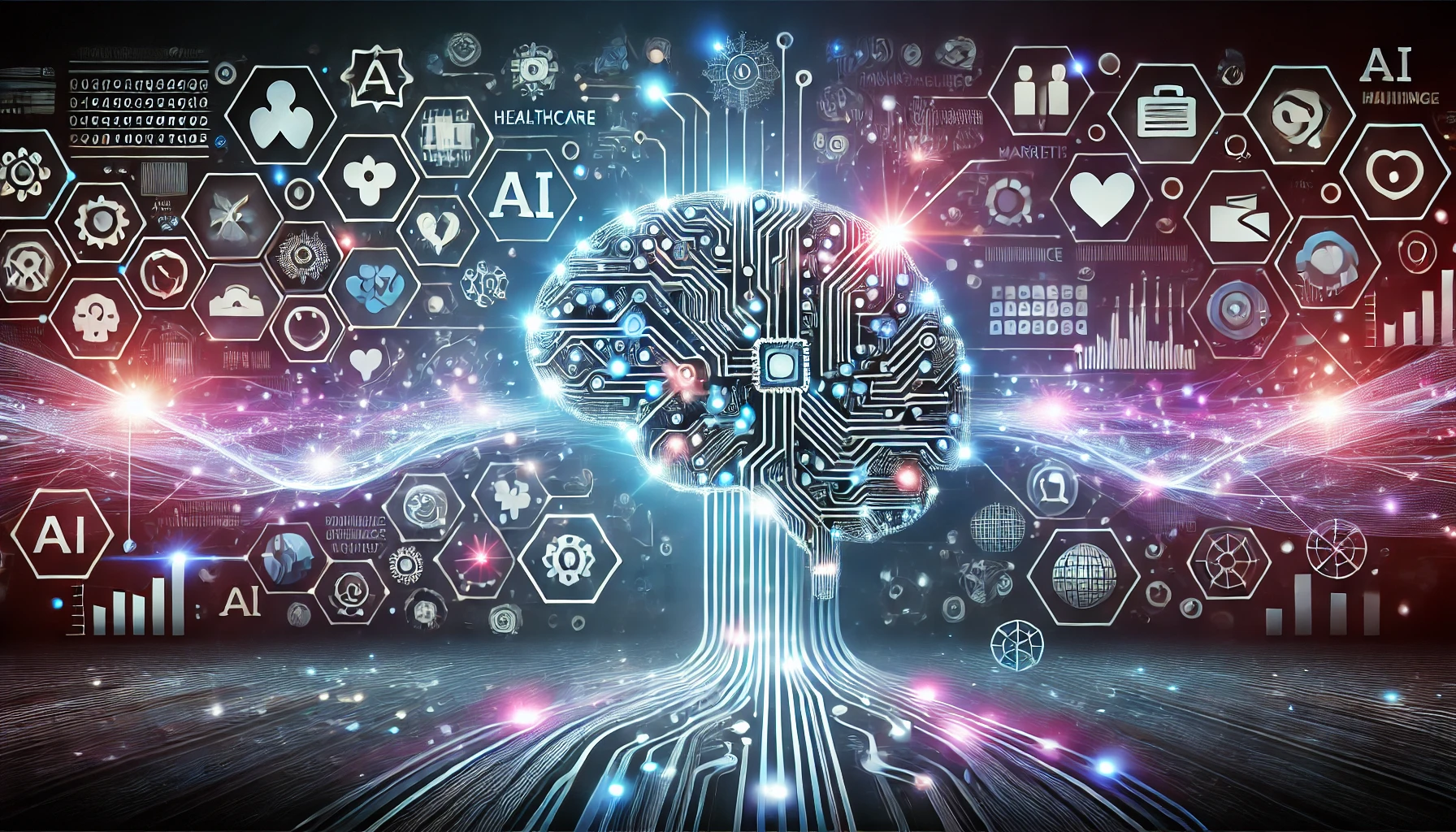Unlocking the Power of AI: Transforming Business and Beyond
Power of AI: Artificial Intelligence (AI) is no longer a futuristic concept confined to science fiction; it’s a powerful tool that is transforming the way we live, work, and interact. Businesses across industries are increasingly recognizing the potential of AI to revolutionize operations, enhance decision-making, and drive innovation. This blog explores how AI is unlocking new possibilities, from business applications to healthcare, and how its integration with machine learning and other technologies is reshaping our world.
The Rise of AI in Business Applications
The use of AI in business applications is growing at an unprecedented pace. From automating routine tasks to providing deep insights through data analysis, AI is enabling businesses to operate more efficiently and effectively. Companies are leveraging AI-powered tools to streamline operations, improve customer experiences, and gain a competitive edge.
AI’s role in business extends to various domains, including marketing, finance, supply chain management, and human resources. For instance, AI-driven marketing strategies are allowing businesses to personalize customer interactions, optimize ad spend, and predict consumer behavior with greater accuracy. In finance, AI is being used to detect fraudulent activities, assess credit risk, and automate trading processes. As AI continues to evolve, its applications in business are expected to expand, offering even more opportunities for innovation.
Integrating AI and Machine Learning for Enhanced Outcomes
The integration of AI and machine learning is a powerful combination that is driving significant advancements across industries. Machine learning, a subset of AI, involves training algorithms on large datasets to enable them to make predictions or decisions without explicit programming. This capability is particularly valuable in scenarios where patterns and trends need to be identified from vast amounts of data.
Businesses are increasingly adopting AI and machine learning integration to enhance decision-making processes. For example, in customer service, AI-powered chatbots can handle routine inquiries, while machine learning algorithms analyze customer interactions to improve response accuracy over time. In manufacturing, AI and machine learning are used to predict equipment failures, optimize production schedules, and reduce downtime.
The synergy between AI and machine learning is also evident in predictive analysis, where businesses can forecast future trends and make informed decisions based on data-driven insights. This integration is helping companies stay ahead of the competition and adapt to rapidly changing market conditions.
AI in Decision Making: Enhancing Business Strategy
AI in decision making is transforming how businesses develop strategies and respond to challenges. By analyzing large datasets and identifying patterns, AI provides valuable insights that human decision-makers might overlook. This ability to process and interpret complex information quickly is particularly beneficial in high-stakes environments where timely decisions are critical.
AI is being used to optimize business strategies in areas such as pricing, product development, and risk management. For example, AI can analyze market trends and customer preferences to recommend optimal pricing strategies or identify emerging product opportunities. In risk management, AI helps businesses assess potential risks and develop contingency plans, reducing the likelihood of costly mistakes.
Moreover, AI-driven decision-making tools are becoming increasingly accessible, allowing businesses of all sizes to benefit from advanced analytics. As AI continues to evolve, its role in decision-making is expected to grow, providing businesses with even more sophisticated tools to navigate complex environments.
AI for Predictive Analysis: Anticipating the Future
Predictive analysis is one of the most promising applications of AI, enabling businesses to anticipate future events and trends with a high degree of accuracy. AI for predictive analysis involves using machine learning algorithms to analyze historical data and make predictions about future outcomes. This capability is particularly valuable in industries such as finance, healthcare, and retail, where forecasting demand, pricing, and customer behavior is crucial.
In finance, predictive analysis powered by AI helps institutions manage investments, assess credit risk, and detect fraudulent activities. Healthcare providers use AI to predict patient outcomes, optimize treatment plans, and improve preventive care. Retailers leverage predictive analysis to forecast demand, manage inventory, and personalize marketing campaigns.
The ability to anticipate future trends and behaviors gives businesses a significant competitive advantage. By harnessing the power of AI for predictive analysis, companies can make more informed decisions, reduce risks, and capitalize on emerging opportunities.
AI-Driven Marketing Strategies: Personalized and Effective
Marketing has always been about understanding the customer, and AI is taking this understanding to a new level. AI-driven marketing strategies are enabling businesses to deliver personalized experiences at scale, improving customer engagement and driving conversions. By analyzing customer data, AI can identify patterns and preferences, allowing marketers to tailor content, offers, and interactions to individual customers.
One of the key benefits of AI in marketing is its ability to optimize campaigns in real-time. AI-powered tools can analyze the performance of marketing initiatives and make adjustments on the fly, ensuring that resources are allocated effectively. Additionally, AI can predict which customers are most likely to convert, allowing businesses to focus their efforts on high-value prospects.
AI-driven marketing strategies are also helping businesses understand customer sentiment and brand perception. By analyzing social media, reviews, and other customer feedback, AI can provide insights into how customers feel about a brand, enabling businesses to address issues and improve their offerings.
The Role of AI in Healthcare: Revolutionizing Patient Care
Healthcare is one of the sectors where AI is making the most profound impact. AI in healthcare is transforming patient care, from diagnosis to treatment and beyond. By analyzing medical records, imaging data, and other health-related information, AI is helping healthcare providers make more accurate diagnoses, develop personalized treatment plans, and improve patient outcomes.
AI-powered tools are also being used to monitor patient health in real-time, allowing for early detection of potential issues and timely interventions. In addition, AI is being used to streamline administrative tasks, such as scheduling appointments and managing patient records, freeing up healthcare professionals to focus on patient care.
The potential of AI in healthcare extends to drug discovery, where AI algorithms are being used to identify potential new treatments and accelerate the development of life-saving medications. As AI continues to advance, its role in healthcare is expected to expand, offering new opportunities to improve patient care and outcomes.
The Benefits of AI Implementation Across Industries
The benefits of AI implementation are being realized across a wide range of industries. From improving efficiency to enhancing customer experiences, AI is helping businesses achieve their goals more effectively. One of the key advantages of AI is its ability to automate routine tasks, allowing employees to focus on more strategic activities.
In manufacturing, AI is being used to optimize production processes, reduce waste, and improve product quality. In retail, AI is helping businesses manage inventory, forecast demand, and personalize customer interactions. In the financial sector, AI is improving risk management, enhancing customer service, and detecting fraudulent activities.
Another significant benefit of AI is its ability to process and analyze large amounts of data quickly. This capability is enabling businesses to gain deeper insights into their operations, customers, and markets, leading to better decision-making and more effective strategies.
AI for Business Automation: Streamlining Operations
Business automation is one of the most impactful applications of AI, offering the potential to streamline operations and reduce costs. AI for business automation involves using AI-powered tools to perform tasks that would otherwise require human intervention. This can include everything from data entry and processing to customer service and inventory management.
AI-driven automation is helping businesses operate more efficiently by reducing the time and effort required to complete routine tasks. For example, AI-powered chatbots can handle customer inquiries 24/7, freeing up human agents to focus on more complex issues. In manufacturing, AI-driven robots are being used to perform repetitive tasks with precision and consistency, reducing the risk of errors and improving productivity.
The ability to automate tasks also allows businesses to scale their operations more effectively. As AI technology continues to evolve, its applications in business automation are expected to expand, offering even more opportunities for businesses to improve efficiency and reduce costs.
The Transformative Power of AI
In conclusion, AI is unlocking new possibilities across industries, from enhancing decision-making and marketing strategies to revolutionizing healthcare and business automation. The integration of AI and machine learning is driving significant advancements, enabling businesses to operate more efficiently and effectively.
As AI technology continues to evolve, its applications are expected to expand, offering even more opportunities for innovation and growth. Whether you’re a business looking to improve efficiency, a marketer seeking to engage customers more effectively, or a healthcare provider aiming to improve patient outcomes, the benefits of AI implementation are clear.
For more insights into how AI is transforming various industries, visit Regent Studies. To learn more about the latest trends in AI and its applications, check out this external resource.




